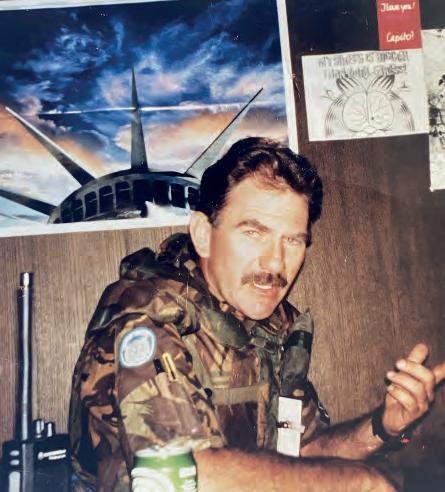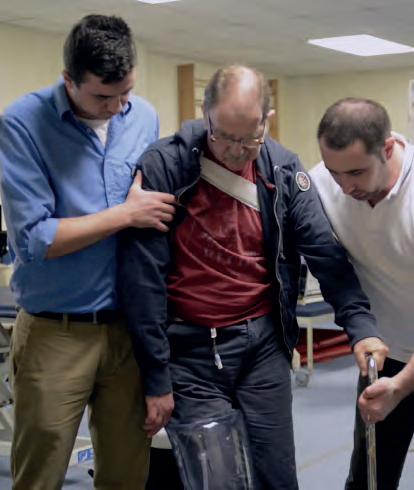
6 minute read
Never give up hope
COL Richard P. Gray OBE (Mil) is a determined man, one who served New Zealand with distinction for (just shy of) 30 years. However, he needed all his determination and that of his wife to come back from a devastating stroke.
Richard Gray enlisted as a staff cadet in the New Zealand Army in January 1970. He attended the Royal Military College at Duntroon, Australia –graduating in 1973. Over the next 10 years his operational service included being part of (Operation Midford) the Commonwealth Monitoring Contingent in Rhodesia (1979/80), the United Nations Interim Force (UNIFIL) in Palestine (1980–81) and for UN Protection Force (UNPROFOR) as the Senior Military Observer and National Officer in Bosnia (1992). In 1994 he was promoted to full Colonel. For his service in Sarajevo, where he led the Military Observers for the first five months of the war, Richard was awarded the military OBE for gallantry. He retired in September 1999.
Advertisement

He has been living in with his wife Fiona Lloyd-Davies in the United Kingdom since 2005.
In 2013, Richard suffered a stroke leaving him barely able to move or speak. Fiona found him on their bed clutching his head in agony. While waiting to be seen in A&E, he lost consciousness. The doctor said that Fiona should call his children in New Zealand as he was in danger of dying.

A scan revealed that Richard had a catastrophic haemorrhage in his brain, bleeding both on the inside and on the surface. The following morning, he had a large section of the left side of his skull removed to allow the brain to swell.

They removed the bone, and the swelling went down. However, a skull protects the brain from atmospheric pressure. With a large piece of skull missing Richard’s brain was exposed to atmospheric pressure and this caused his brain to be pushed to the right side of his skull. It looked like half of his brain was missing.
Three weeks after his stroke, Richard couldn’t speak, and he had no movement in his right side, but Fiona felt that there was hope.
Richard’s recovery was slow. He’d be hoisted out of bed into a chair for half an hour or so, but he couldn’t do more than that. A key event in his recovery was to replace the missing part of his skull with a titanium plate. Fiona felt that without this operation, a cranioplasty, Richard’s rehabilitation would stall.
There was a strong likelihood that Richard’s operation would be postponed, even for months. He was assessed every 6 weeks, and if there was no improvement his funding might not be continued and he risked being transferred to a care home or back home where he would need a lot of care, but without the cranioplasty he wouldn’t make any improvements.
Fortunately, Fiona was able to get support and schedule the operation. It was a significant step in Richard’s recovery.
After one year of hospitals and neurorehabilitation, Fiona was able to get Richard transferred to the Raphael Hospital — Another specialist neurorehabilitation unit, but one which specialised in applying a holistic approach and unusually, delivered multiple therapies 7 days a week, 365 days of the year. Having heard of neuroplasticity, she felt this was the chance that Richard needed to start his journey back to life.

Through daily physical and therapy sessions at Raphael Hospital, Richard learnt how to walk again. Fiona saw other improvements as well.

The neuroplasticity offers a chance of recovery, but to fulfil it there was a lot of hard work to go in. Fiona and Richard’s doctors all felt that he could do it.
Life is far from back to normal for Richard and Fiona, but Richard can garden, and even occasionally now walks to the corner store (to buy some flowers for Fiona).
What can Richard’s experience offer other veterans and their families?
In 2018, Fiona made a film of their journey for BBC’s Horizon My Amazing Brain: Richard’s War, which can be found online.











